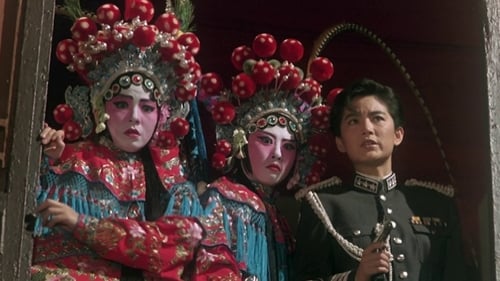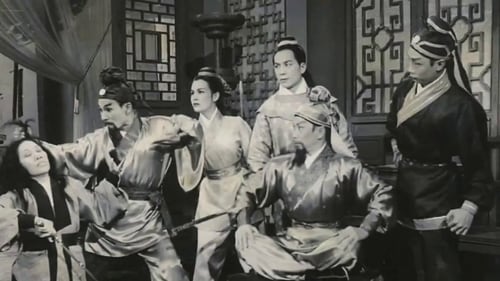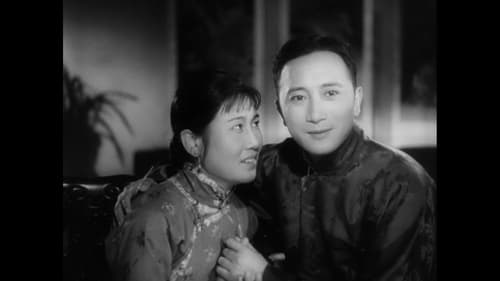
Art Direction

Production Design
The film is set in 1913 Beijing, during Yuan Shikai's presidency of the Republic of China. It depicts the adventures of a team of unlikely heroines: Tsao Wan, a patriotic rebel who dresses as a man; Sheung Hung, a woman in search of a missing box of jewels; and Pat Neil, the daughter of a Peking Opera impresario.

Art Direction
Hong Kong's Ironman stepped up to the plate when Dr. No (1962) took the world by storm in the 1960s. Tso Tat-wah, the quintessential tough guy of Cantonese cinema who had appeared in dozens of popular action films, was licensed to spy in several 007 imitations. Here, he is Agent 303, the lucky number "3" a vivid sign of East-West integration. Presented in glorious widescreen, the film is garnished with secret weapons and ominous hideouts, mind games and technological intrigues, violence and sex, the latter in the form of a silhouette striptease!

Sets & Props Artist
During World War II, spy Wu Lai-sheung is instructed by her superior Fan Yeung-shan to murder spy number 13 Cheung Chi-ping. While Wu establishes a relationship with Sakei, the assistant general of the Japanese army, she also gets acquainted with Cheung. Cheung and Wu fall in love. Wu recommends Cheung to become Sakei's driver. Cheung pretends to court the Japanese spy Siu-kuen, but Siu-kuen arranges to kill the spies contacting with him. Cheung has seen through Kuen's identity for long. When Kuen is going to kill Wu, Cheung kills Kuen, Fan compels Wu to kill Cheung. Wu follows the instruction to murder Cheung. After the murder, Wu disappears. After the war, Fan discovers Wu ends up in asylum. When he visits Wu, he tells her of Cheung's innocence. This breaks Wu's heart. Cheung turns out to have seen through Wu's identity for a long time and pretended to have been killed to cover up his identity and facilitate his work. With the truth known and the war ended, Cheung and Wu married.

Sets & Props Artist
Cheung framed Chan For. Chan orders his wife not to tell this to their children, Ah Lan and Hung. His wife passes away. On her deathbed, she asked a neighbour, To Chung-man, to take care of her children. Claiming to be a good friend of their father, Chan For moves in to the bed next to Ah Lan to take care of his children. Hung likes this uncle because he always treats him generously. But Ah Lan finds "Uncle For" weird and enthusiastic. Ah Lan is forced to pay her mother's debt. Hung is suffering from acute appendicitis. To solve Ah Lan's financial problem, Chung-man returns to his rich family and accept an arranged marriage. Ah Lan decides to sell herself to the construction site foreman for one night. Chan For wants to stop his daughter from making this deal, so he agrees to work for Cheung again. The next day he carries out a robbery and is caught. Ah Lan and Chung-man visit him in jail, and hold their wedding ceremony in front of him. He looks forward to the days when he returns.

Art Direction
Lee Sun-fung is renowned for adapting literary classics for the silver screen. To commemorate the seventh anniversary of the Union Film Enterprise known for producing quality films and co-founded by Lee, Human Relationships is adapted from writer Ba Jin's novel into film. The Yiu family moves into a manor. Mrs Yiu, while frustrated by the way her step-son is spoiled by her husband and mother-in-law, develops a friendship with a kid (Michael Lai) who steals flowers from the mansion's garden. She later learns that he is the son of the place's former owner whose downfall at middle age is the result of being spoiled when young. Lai was only a child but gained a foothold among seasoned veterans like Cheung Wood-yau, Ng Cho-fan and Pak Yin.

Art Direction
Written by the great librettist Tong Tik-sang, and featuring Lee Tit's elegant direction and superb performances from Yam Kim-fai and Pak Suet-sin, "Butterfly and Red Pear Blossom" brings Cantonese opera to cinematic life. The film features two lovers who have never met in person but whose poetry over three years has subtly declared their unyielding love. Yam's minimalist acting style enables her to convey dynamic passion as well as step about the stage with ease and accomplish the image of a resolute, yet gentle, scholar. Pak meanwhile defies a prime minister with pride and dignity.

Art Direction
The late Ming court is a corrupt regime. Lin Ngai-sheung, nicknamed the 'Jade Killer', inherits the swordplay book of Tianshan and becomes a bandit of the people to rob from the rich. Her feud with Wudang Sect's Cheuk Yat-hong rooted from the time she held up a corrupt official. Cheuk, instigated by others, sees Lin as his enemy. However, Lin slowly falls for him. When Cheuk learns the truth, he helps Lin to defeat her enemies.

Art Direction
A delicious comedy from Union Film, Money, traces the journey of a bag of cash from a bank robbery. The humour switches between the witty and the absurd, offering a biting examination of human nature when men and women are confronted with the chance of unearned wealth.

Art Direction
Yeung and Kwok are best friends whose wives become pregnant around the same time. Yeung's wife, Pao Sik-yeuk, finds a wounded man hidden in the barn and secretly helps him. He turns out to be a foreign Prince and disaster follows. The sons are then scattered with one growing up in the Prince's kingdom and the other in Mongolia. Now grown, they go out into the world and discover the secret details of their lives.

Art Direction
Guerrilla member Ting Siu-yuen works as a playwright and Lee, the leader of an opera troupe. They conceal their identities in the troupe in order to gather military intelligence. Yuen gradually falls in love with the lead actress Mui Law-heung. Ting is unsettled to learn that County Chief Fong covets Mui. He sneaks into Fong's residence and is astounded by the sight of his old lover Pak Kuen, now Fong's wife. Fong colludes with the military chief in conducting vicious schemes. With Kuen's help, Yuen is able to get the intelligence. But as Heung is not an insider, she reports to the Governor about the illicit relationship between Yuen and Kuen. Kuen backs Yuen to eliminate the conspirators and bring about the union of Yuen and Heung.

Set Designer
Though her marriage with rich businessman Chan Hak-lit is crumbling, Anna Poon refuses to accept her childhood sweetheart Wong Kei-shu's courtship. Anna's younger sister Mei-na has a crush on Shu and treats Lee Man coldly. When she sees Anna being with Shu, she taunts Anna with stealing who she likes. Anna is hurt and goes back to Chan's house. Chan holds a house party and invites business celebrities. Shu attends it and when tells Anna he loves her when they dance. Anna rejects him and tells him never to see her again. Chan goes to the racecourse. When Shu falls down from a horse, Anna faints. Chan asks Anna what her relationship with Shu is. He warns her not to have any wrongdoing and ruin his reputation. Shu is fine and asks Anna to meet for the last time. Anna cannot turn down him and goes to meets him. Lit miscomprehends the situation and files a divorce. He even forbids Anna to see their daughter. A distressed Anna becomes a victim of love in a conservative society.

Set Designer
Chan Sai-wah abides by his late father's word and marries the wealthy Yam Suk-kuen. They have a son, Kwok-leung. Though Wah is manager of the hotel owned by his father-in-law, Kuen is not a good wife. For all the years of their marriage, Wah has never been happy. Attracted to the humble and honest Carrie Mui, Wah decides to leave his domineering wife Kuen, but is stopped by his father-in-law. The lovers set off to Macau for a new start.
Their life has become increasingly miserable under the pressure from Yam's family. When Wah leaves to seek help from his son in Hong Kong, Carrie decides she should leave so that Wah can go without feeling any guilt or burden. On the other hand, Wah is too ashamed to face his son, and returns to Macau. He lives his life in misery. Years pass, the lovers meet again. Wah is reduced to begging in the streets while Carrie becomes an opera diva.

Art Direction
Cold Nights features great performances by both Pak Yin as a tough minded “new woman”, Shusheng, and Ng Cho-fan as her weak husband, Wang Wenxuan, whose spirits have been crushed by the Sino-Japanese war.

Art Direction
The film commences with Ching (Tang Bik-wan) lamenting over her bleak life through singing: her mother died early and her stepmother (Lam Mui-mui) is wicked. The song precedes her appearance in the house while the cinematography helps to tug at the emotional heartstrings. Because of her debt-ridden father, Ching is forced by the stepmother to marry an old invalid. To prevent the marriage, Ching's lover Ho (Chan Kam-tong) raises money by agreeing to marry his own cousin (Fung Wong Nui). Ching's life is doomed, yet, when the stepmother absconds with the money. With all her hopes dashed to the ground, Ching decides to opt out of marriage for life. However, witnessing her 'self-combed' sworn sisters being bullied even to the point of committing suicide further devastates her. This tragic heroine comes to life through Tang's masterful performance both as a singer and an actor. The climatic and tear-jerking scene of Ching dying is definitely a highlight of the film.

Set Supervisor
Ko Suk-ying is saddened over her arranged marriage as manipulated by her father Hak-ming. Ko Kok-sun's Cousin Chow Wai's spends the Mid-Autumn Festival before her marriage with the Kos. She has been in love with Sun. Sun finds out about her love for him when she is about to be married off, he is too weak to oppose to Wai's betrothal to another man. Sun's son, Hoi-sun, falls ill. Fearing the displeasure of his elders, Sun dares not consult a western doctor.
Meanwhile, another dispute arises among members of the family over the ancestral land. When accused of being incompetent in his management, Sun takes the blame silently. Wai dies of grief while Hoi-sun becomes a victim of mistreatment. Sun is devastated at this double blow.
Hak-ming instructs Sun to arrange for Ying's wedding. Knowing the kind of man Ying's fiancee is, Sun is reluctant. Not wanting to follow in Wai's footsteps, Ying fights for her own rights, and backed by an enlightened Sun, she leaves for a new start.

Art Direction
Ko Suk-ying is saddened over her arranged marriage as manipulated by her father Hak-ming. Ko Kok-sun's Cousin Chow Wai's spends the Mid-Autumn Festival before her marriage with the Kos. She has been in love with Sun. Sun finds out about her love for him when she is about to be married off, he is too weak to oppose to Wai's betrothal to another man. Sun's son, Hoi-sun, falls ill. Fearing the displeasure of his elders, Sun dares not consult a western doctor.
Meanwhile, another dispute arises among members of the family over the ancestral land. When accused of being incompetent in his management, Sun takes the blame silently. Wai dies of grief while Hoi-sun becomes a victim of mistreatment. Sun is devastated at this double blow.
Hak-ming instructs Sun to arrange for Ying's wedding. Knowing the kind of man Ying's fiancee is, Sun is reluctant. Not wanting to follow in Wai's footsteps, Ying fights for her own rights, and backed by an enlightened Sun, she leaves for a new start.

Sets & Props Artist
"Family" (1953), which launched the Union Film legacy, "Spring" (1953) and "Autumn" (1954) are adaptations of Ba Jin's highly regarded novel "Torrent Trilogy". In "Family", director Ng Wui skilfully condenses the voluminous first part of the novel into an emotionally powerful and intellectually focused story of youngsters struggling to survive oppression and repression in a feudalistic family. This well-received film quickly established the company's reputation.
















